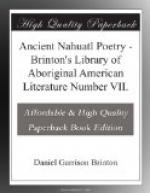His remarks were probably a generalization from a chapter in Torquemada’s Monarquia Indiana, in which that writer states that the songs at the sacred festivals differed in subject with the different months and seasons. Thus, in the second month of their calendar, at its stated festival, the people sang the greatness of their rulers; in the seventh month all the songs were of love, of women, or of hunting; in the eighth the chants recalled the noble deeds of their ancestors and their divine origin; while in the ninth month nothing was heard but verses fraught with lamentation for the dead.[12] With less minuteness, Father Duran gives almost the same information. He himself had often heard the songs which Montezuma of Tenochtitlan, and Nezahualpizintli of Tezcuco, had ordered to be composed in their own honor, describing their noble lineage, their riches, their grandeur and their victories. These songs were in his day still sung at the public dances of the natives, and he adds, “although they were filled with laudation of their ancient rulers, it gave me much pleasure to hear the praises of such grandeur.” There were other poets, he observes, who lived in the temples and composed songs exclusively in honor of the gods.[13]
These general expressions may be supplemented by a list of terms, specifying particular classes of songs, preserved by various writers. These are as follows:—
melahuacuicatl: this is translated by Tezozomoc, “a straight and true song."[14] It is a compound of melahuac, straight, direct, true; and cuicatl, song. It was a beginning or opening song at the festivals, and apparently derived its name from its greater intelligibility and directness of expression. A synonym, derived from the same root, is tlamelauhcayotl, which appears in the title to some of the songs in the present collection.
xopancuicatl: this term is spelled by Ixtlilxochitl, xompacuicatl, and explained to mean “a song of the spring” (from xopan, springtime, cuicatl, song). The expression seems to be figurative, referring to the beginning or early life of things. Thus, the prophetic songs of Nezahualcoyotl, those which he sang when he laid the foundation of his great palace, bore this name.[15]
teuccuicatl: songs of the nobles (teuctli, cuicatl). These were also called quauhcuicatl, “eagle songs,” the term quauhtli, eagle, being applied to distinguished persons.
xochicuicatl: flower-song, one singing the praises of flowers.
icnocuicatl: song of destitution or compassion.
noteuhcuicaliztli: “the song of my lords.” This appears to be a synonymous expression for teuccuicatl; it is mentioned by Boturini, who adds that on the day sacred to the god Xiuhteuctli the king began the song so called.[16]
miccacuicatl: the song for the dead (miqui, to die, cuicatl). In this solemn chant the singers were seated on the ground, and their hair was twisted in plaits around their heads.[17]




